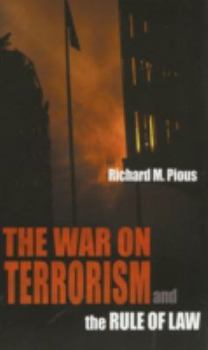The War on Terrorism and the Rule of Law
Select Format
Select Condition 
Book Overview
Pious' book provides a detailed discussion of due process issues invoked by the George W. Bush administration's war on terror. This book questions the premise that the government's obligation to protect Americans from terrorist acts leads to an inevitable tradeoff between constitutional and legal guarantees of due process. Instead, Pious argues that bringing terrorists to justice through the due process of law provides more rather than less security. The introductory chapter begins by laying out worst-case scenarios for terrorist attacks on the United States. Case studies of recent court cases document that when law enforcement takes shortcuts it may not only result in the imprisonment of innocent people, but also distorts or falsifies the intelligence needed to deploy law enforcement resources in the most efficient manner. Subsequent chapters apply this perspective to such topics as government surveillance (including warrantless surveillance), data-mining, immigration "hold and clear" hearings, the application of material support and material witness statutes, rules of evidence determining access to witnesses, the indefinite detention of American citizens and non-citizens, the use of military hearings, and the authorized and unauthorized mistreatment of detainees to obtain intelligence. Pious provides accessible, up-to-date materials such as testimony and speeches by Bush administration officials presenting their arguments for an "intelligence-driven" approach rather than a due process approach to combat terrorism, congressional testimony refuting these claims, proposed legislation to require adherence to due process of law, recent statute law delegating extensive power to government officials, and federal cases attempting to strike a balance between governmental prerogative claims and the rights of defendants. The cases have been extensively edited to make them accessible to undergraduate students and other non-lawyers. The author provides extensive commentaries and notes, some of which are based on his own research, and others that present alternative viewpoints. These are designed to stimulate students, organize class discussion, and point out further avenues of research and inquiry. Suggested readings at the end of the book provide students with a preliminary bibliography for short essays or longer research papers.
Format:Paperback
Language:English
ISBN:0195330730
ISBN13:9780195330731
Release Date:March 2006
Publisher:Oxford University Press, USA
Length:280 Pages
Weight:0.95 lbs.
Dimensions:0.6" x 6.8" x 8.8"
Customer Reviews
1 rating
Examining the Laws on Terrorism
Published by Thriftbooks.com User , 18 years ago
This is a book on the case law that has been brought up regarding the American prosecution of suspected terrorists under the Patriot's Act and other such laws. The major chapter headings are as good an indication of the contents fo the book as any other: Must We Trade Civil Liberties for National Security May the President Override Patriot Act and Foreigh Intelligence Surveillance Ace Provisions Does the Patriot Act Infringe on Privacy Rights Does the Patriot Act Impede Freedom of Association Material Witnesses: Can the Government Hold Them in Indefinite Detention Hold and Clear: May the Government Hold Aliens in Indefinite Detention Indefinite Detention of American Citizens: Is it Constitutional? Indefinite Detention of Enemy Combatants: Is It Constitutional Interrogation: Are There Limits? Military Tribunals: Is There a Role for Judicial Oversight? All of these are very interesting and may well have an impact far beyond the current troubles. But perhaps the last chapter, on Military Tribunals is the most significant. We have rules to handle criminals. We have rules to handle wartime prisoners of war. In which category do you put the people who committed 9/11? If they were soldiers fighting in a cause, the rules of the Geneva Convention say that since they weren't in uniform they could be tried as spies and shot. We didn't capture these people, of course, but we did capture Taliban fighters in Afghanistan -- where do they fit? Do we perhaps need new laws to cover new situations, and what should these laws say?





